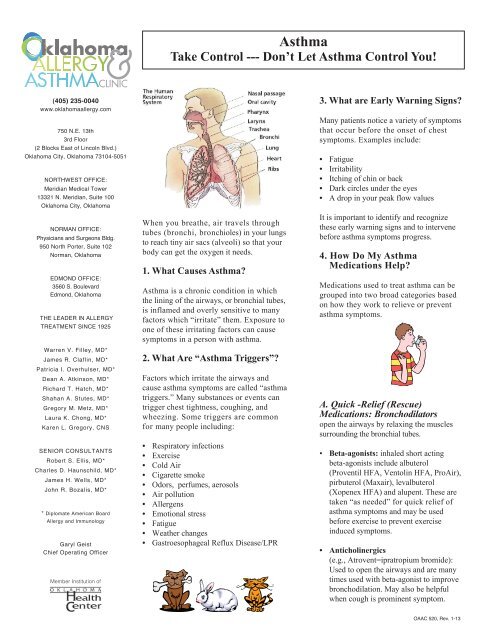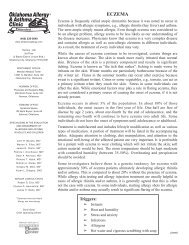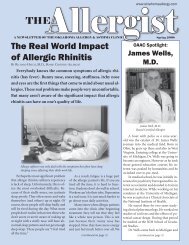Asthma Take Control - Oklahoma Allergy and Asthma Clinic
Asthma Take Control - Oklahoma Allergy and Asthma Clinic
Asthma Take Control - Oklahoma Allergy and Asthma Clinic
Create successful ePaper yourself
Turn your PDF publications into a flip-book with our unique Google optimized e-Paper software.
<strong>Asthma</strong><br />
<strong>Take</strong> <strong>Control</strong> --- Don’t Let <strong>Asthma</strong> <strong>Control</strong> You!<br />
(405) 235-0040<br />
www.oklahomaallergy.com<br />
750 N.E. 13th<br />
3rd Floor<br />
(2 Blocks East of Lincoln Blvd.)<br />
<strong>Oklahoma</strong> City, <strong>Oklahoma</strong> 73104-5051<br />
NORTHWEST OFFICE:<br />
Meridian Medical Tower<br />
13321 N. Meridian, Suite 100<br />
<strong>Oklahoma</strong> City, <strong>Oklahoma</strong><br />
NORMAN OFFICE:<br />
Physicians <strong>and</strong> Surgeons Bldg.<br />
950 North Porter, Suite 102<br />
Norman, <strong>Oklahoma</strong><br />
EDMOND OFFICE:<br />
3560 S. Boulevard<br />
Edmond, <strong>Oklahoma</strong><br />
THE LEADER IN ALLERGY<br />
TREATMENT SINCE 1925<br />
Warren V. Filley, MD*<br />
James R. Claflin, MD*<br />
Patricia I. Overhulser, MD*<br />
Dean A. Atkinson, MD*<br />
Richard T. Hatch, MD*<br />
Shahan A. Stutes, MD*<br />
Gregory M. Metz, MD*<br />
Laura K. Chong, MD*<br />
Karen L. Gregory, CNS<br />
SENIOR CONSULTANTS<br />
Robert S. Ellis, MD*<br />
Charles D. Haunschild, MD*<br />
James H. Wells, MD*<br />
John R. Bozalis, MD*<br />
* Diplomate American Board<br />
<strong>Allergy</strong> <strong>and</strong> Immunology<br />
Garyl Geist<br />
Chief Operating Officer<br />
Member Institution of<br />
When you breathe, air travels through<br />
tubes (bronchi, bronchioles) in your lungs<br />
to reach tiny air sacs (alveoli) so that your<br />
body can get the oxygen it needs.<br />
1. What Causes <strong>Asthma</strong>?<br />
<strong>Asthma</strong> is a chronic condition in which<br />
the lining of the airways, or bronchial tubes,<br />
is inflamed <strong>and</strong> overly sensitive to many<br />
factors which “irritate” them. Exposure to<br />
one of these irritating factors can cause<br />
symptoms in a person with asthma.<br />
2. What Are “<strong>Asthma</strong> Triggers”?<br />
Factors which irritate the airways <strong>and</strong><br />
cause asthma symptoms are called “asthma<br />
triggers.” Many substances or events can<br />
trigger chest tightness, coughing, <strong>and</strong><br />
wheezing. Some triggers are common<br />
for many people including:<br />
• Respiratory infections<br />
• Exercise<br />
• Cold Air<br />
• Cigarette smoke<br />
• Odors, perfumes, aerosols<br />
• Air pollution<br />
• Allergens<br />
• Emotional stress<br />
• Fatigue<br />
• Weather changes<br />
• Gastroesophageal Reflux Disease/LPR<br />
3. What are Early Warning Signs?<br />
Many patients notice a variety of symptoms<br />
that occur before the onset of chest<br />
symptoms. Examples include:<br />
• Fatigue<br />
• Irritability<br />
• Itching of chin or back<br />
• Dark circles under the eyes<br />
• A drop in your peak flow values<br />
It is important to identify <strong>and</strong> recognize<br />
these early warning signs <strong>and</strong> to intervene<br />
before asthma symptoms progress.<br />
4. How Do My <strong>Asthma</strong><br />
Medications Help?<br />
Medications used to treat asthma can be<br />
grouped into two broad categories based<br />
on how they work to relieve or prevent<br />
asthma symptoms.<br />
A. Quick -Relief (Rescue)<br />
Medications: Bronchodilators<br />
open the airways by relaxing the muscles<br />
surrounding the bronchial tubes.<br />
• Beta-agonists: inhaled short acting<br />
beta-agonists include albuterol<br />
(Proventil HFA, Ventolin HFA, ProAir),<br />
pirbuterol (Maxair), levalbuterol<br />
(Xopenex HFA) <strong>and</strong> alupent. These are<br />
taken “as needed” for quick relief of<br />
asthma symptoms <strong>and</strong> may be used<br />
before exercise to prevent exercise<br />
induced symptoms.<br />
• Anticholinergics<br />
(e.g., Atrovent=ipratropium bromide):<br />
Used to open the airways <strong>and</strong> are many<br />
times used with beta-agonist to improve<br />
bronchodilation. May also be helpful<br />
when cough is prominent symptom.<br />
OAAC 520, Rev. 1-13
B. Long-term, <strong>Control</strong>ler Medications:<br />
►Anti-inflammatory Drugs: control inflammation<br />
of the bronchial tubes. Prevent asthma symptoms<br />
by reducing the ever- present inflammation of the<br />
airway lining. They take time to work, <strong>and</strong> must be<br />
used on a regular basis. There are three families of<br />
anti-inflammatory drugs.<br />
• Steroids: Inhaled steroids are “cortisone-like”<br />
steroids which work locally in the lungs to<br />
decrease inflammation. (e.g., Asmanex,<br />
Azmacort, Vanceril, QVAR, Aerobid, Flovent,<br />
Pulmicort). Systemic steroids (e.g. prednisone,<br />
Medrol) are strong-inflammatory drugs most<br />
often used in short courses (about 3-7 days).<br />
• Leukotriene blockers: Medications which<br />
block the receptors for leukotrienes (Accolate,<br />
Singulair) or block the synthesis of leukotriense<br />
(Zyflo). Leukotrienes are cellular mediators<br />
which lead to bronchial inflammation <strong>and</strong><br />
narrowing, <strong>and</strong> cause an increase in mucus<br />
production in the bronchial tubes.<br />
• Combination Inhaled steroid/ Long-acting<br />
Bronchodilator (e.g. Advair Diskus, Advair<br />
HFA, Symbicort)<br />
• Cromolyn (Intal) <strong>and</strong> nedocromil (Tilade)<br />
►Bronchodialators:<br />
• Long-acting bronchodilators (e.g. Serevent,<br />
Foradil) Should not be used as “rescue” medication<br />
or alone as controller.<br />
• Theophylline (e.g., Theo-24, Uniphyl ): oral<br />
bronchodilator to be taken on a regular, longterm<br />
basis.<br />
C. Potential Side effects<br />
• Bronchodilators: increased heart rate, jitteriness<br />
• Inhaled steroids: thrush, hoarseness<br />
• Long-acting bronchodilators: potential increased<br />
risk of rare, serious life-threatening asthma attacks<br />
• Oral steroids (short term use) increased appetite,<br />
weight gain, water retention, moodiness, irritability,<br />
insomnia, stomach upset<br />
• Oral steroids (long-term use), growth suppression,<br />
cataracts, glaucoma, osteopenia/osteoporosis<br />
Remember: “An ounce of prevention is<br />
worth a pound of cure!”<br />
5. What Happens During An <strong>Asthma</strong><br />
Flare-Up ?<br />
<strong>Asthma</strong> symptoms occur when there is blockage of<br />
the bronchial tubes, causing a whistling noise called<br />
“wheezing”, cough, shortness of breath, <strong>and</strong>/or chest<br />
tightness. This blockage is caused by three things:<br />
• Swelling or “edema”: the lining of the bronchial<br />
tubes swells, exp<strong>and</strong>ing inward, making the size<br />
of the airway smaller. This swelling is caused by<br />
increased inflammation of the bronchial tube lining.<br />
• Mucus secretion: the tissues that line the<br />
bronchial tubes secrete extra mucus which can<br />
plug the narrowed air passages even further.<br />
• Bronchospasm: the muscles that surround the<br />
bronchial tubes tighten <strong>and</strong> make the airway<br />
even smaller.<br />
Together, the swelling, mucus, <strong>and</strong> bronchospasm in<br />
the airways make it harder to move air through the<br />
bronchial tubes. The person with asthma must work<br />
harder <strong>and</strong> breathe faster to move air through these<br />
narrowed airways<br />
6. How Can I Prevent <strong>Asthma</strong> Symptoms<br />
From Becoming More Severe?<br />
• Avoid the asthma triggers that may be causing<br />
the symptoms.<br />
• Learn to recognize early warning signs<br />
• Stop what you are doing, rest, <strong>and</strong> take slow<br />
deep breaths.<br />
• Sip warm fluids to help relax<br />
• <strong>Take</strong> two puffs of your bronchodilator inhaler to<br />
help relieve your symptoms<br />
• Follow your asthma management plan<br />
Remember: Treat the symptoms before<br />
they become severe<br />
7. When Do I Call the Doctor’s Office?<br />
Sometimes asthma episodes become more severe<br />
despite your best efforts to treat them early. A<br />
change or increase in medications or further medical<br />
treatment may be needed. Call your doctor’s office<br />
or seek medical help if:<br />
• <strong>Asthma</strong> symptoms continue or worsen despite all<br />
treatment steps that your physician has given you<br />
• The medicines are not helping or not lasting as<br />
long as they should.<br />
• You have any doubt about the severity of an attack<br />
<strong>Oklahoma</strong> <strong>Allergy</strong> & <strong>Asthma</strong> <strong>Clinic</strong><br />
750 N.E. 13th Street, Third Floor<br />
<strong>Oklahoma</strong> City, OK 73104<br />
(405)235-0040





